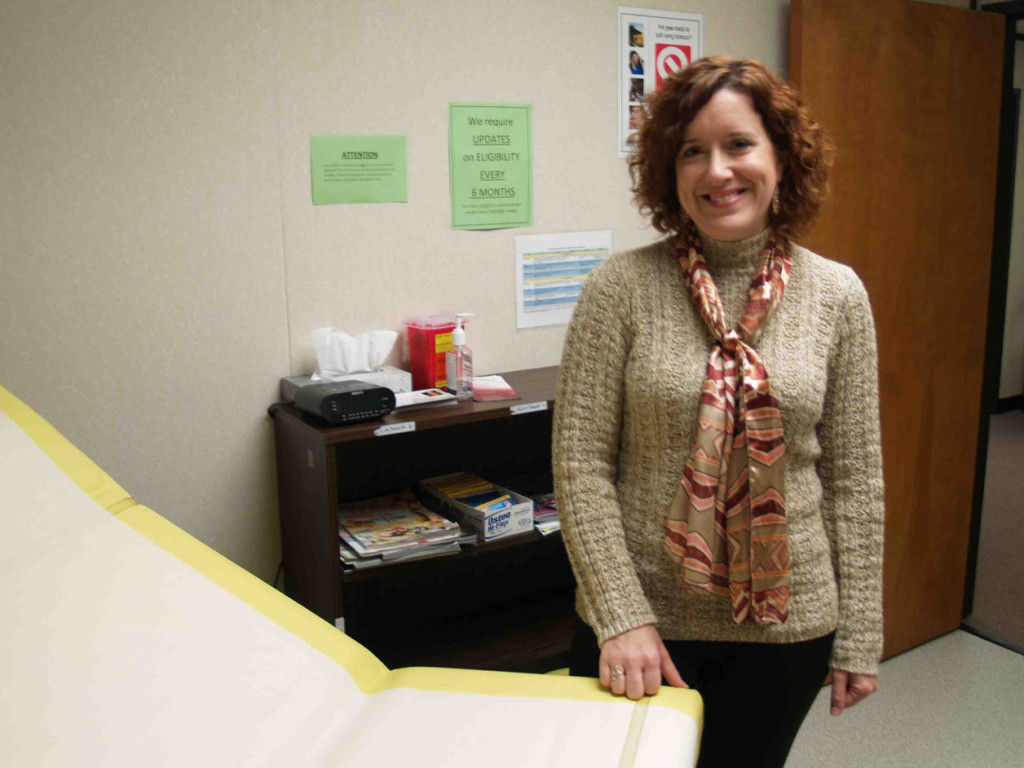 The Stigma of Temporary Aid
The Stigma of Temporary Aid
—Alamance County, NC, aid provider and former aid recipient—
My ex-husband and I owned a restaurant and the restaurant, it started not going very well. And so he actually started having a drinking problem. So at that point, I decided to move out.
So my son, who was three or four at the time, we moved into an apartment, and of course, trying to maintain two households…. So at any rate, I had worked at the restaurant before, but then I decided to go back to work and started working for a chiropractor and started out in claims, not a lot of hours, and then ended up being the office manager.
So we had family coverage, but as time went on and the restaurant continued to fail, the insurance was dropped. So I got health insurance through my employer at that time, once I became the officer manager. But to get family coverage, it was very expensive, so I was trying to keep up paying my rent—utilities, food, all of this, and—I’m trying to think—Greyson was not in daycare at the time; he was with a family member, so I didn’t have the daycare expenses. But I didn’t use public assistance at all.
And so we had a patient that came in that was an RN, had three or four kids. Her husband had been in the military and had some mental issues, so he was on disability. And she brought one of her sons in there, and he had NC Health Choice. It’s insurance for children. It’s almost like, you make too much for Medicaid but it’s still an option so that your children are covered. So anyway, she—just being honest—she drove a 4-Runner and she was a nurse. And in my mind, I’m going, “How in the world does she have her kids on this NC Health Choice?”
And so I just got to looking into it and found out that I might be eligible for it to get Greyson coverage. I was just brought up…my dad was a firefighter. He brought us up with a lot of morals and work ethic, and he would always say insurance is important. And I knew it was. So anyway, I checked into it, and I thought, “Well, I’m just going to see if I can get Greyson on this NC Health Choice.” So at first, it was hard for me to walk over to DSS [Department of Social Services] because at that point, they didn’t have things online that you could get the application. And I didn’t even know really where DSS was. So, I got over to DSS, didn’t know where to go, and I mean, I was looking around going, “I should not be here. I don’t belong here,” you know?
So, anyway, I went through the process and a social worker called and said, “Well, he’s been approved.” And I was actually shocked because I thought, at that time I was making $15 an hour. This was 13, 14 years ago. I really did not think that he would be entitled to it. So I was really shocked that they did it. At any rate, it helped me through a tough time.
So he stayed on it a year, and then I was more able, after his dad and I divorced, with settlement and all that, and then working more hours and that kind of thing, that I was able to put him on my insurance. So he had it for a year, and even though I was ashamed at first to do it, I got to thinking, “I have worked all my life. I have worked since I was fifteen years old and I have paid taxes. And if they say he’s entitled to it, then I might as well use it so that he can…” Because at that age, they go to the doctor more on a regular basis when they’re small. Because actually, during that time, Greyson was a carrier of strep throat, and so we were going back and forth. They would put him on an antibiotic, he would be fine for a month, and then bam, he’d have it again. Plus it covered dental, so I made sure he went and got his teeth cleaned twice a year. And it also covered eye, and at that time he actually was in glasses. So, it covered that, so that was important to me to make sure that he got the care.
Stigma of Welfare
I know a friend of my husband, and she was in a similar situation, and I told her, you know, that she could probably get her kids on NC Health Choice. And her dad is an attorney, and she was actually interested in checking into it, but her mother is a wife of an attorney, and they pitched a fit. They said, “You are not putting those kids on welfare. My grandkids will not be on welfare.”
Tracy is the Director of the Open Door Clinic, an aid provider, as well as a former aid recipient. She is Caucasian, in her early forties, and was interviewed by Tom Mould on January 24, 2014.


